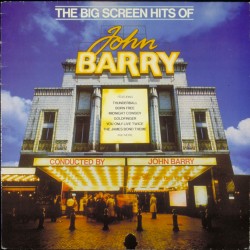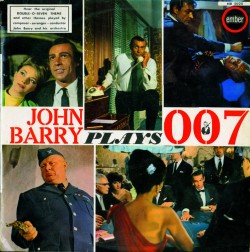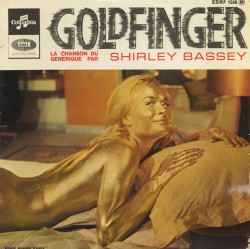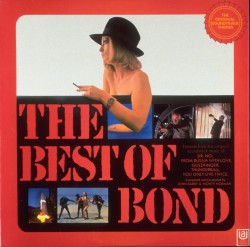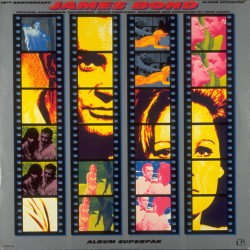>THE JOHN BARRY INTERVIEW - 1994
Geoff Leonard
For John Barry, the 3rd November of 1994 proved to be much more than just another birthday for him. On that day, much to his obvious delight, his wife Laurie gave birth to a baby - Jonpatrick - their first child, and Barry's first son (he already has three grown-up daughters). Barry shows no sign of slowing down his heavy schedule and when we spoke in December, he was enthusiastically starting work on a project which involves 'Imax', a recently developed film technique, which uses 3-D and seventy-foot high screens. However, we began our conversation by talking about his latest film score, 'The Specialist', before turning to other recently completed and forthcoming projects.
John, The Specialist is quite different from the projects you've tackled recently, what particularly interested you about the film?
Well, Stallone usually concentrates on action type films. This film wasn't that, it was more of a movie film-noire style, and it was that which attracted me to it. Another thing I particularly liked was the fact that the Stallone character and the Sharon Stone character don't meet until about a third of the way through the movie. The fact that he stalks her, they have telephone contact, and he starts to fall in love with her just through this type of contact, I found really interesting. So the music has a major part to play, I felt, in getting that relationship going, because as they weren't actually physically together from the start, it helped set the mood between the two of them. I thought that was something I'd never had to do before in a movie.
The CD album is almost an hour long, does this reflect the fact there is plenty of music in the film?
Yes, there is a lot of music in the movie. I suppose there are only two really big action sequences, one at the beginning and one at the end, but what also interested me was that there wasn't the usual kind of car chase thing with lots of noise. The excitement in the movie was the build-up to the explosion each time. So although the audience know what's going to happen, I use a lot of red-herring cues, you build each time and then as the explosion happens the noise cuts off. So it wasn't a typical action film. You know, I get offered a lot of action scripts, and having done most of the Bond films, I really want to do something a little different. I also thought it would be good to do a big-audience picture, which it has proved to be. So, although I admit it's a very popular genre, it allowed me to do something different from the usual action score.
Who first approached you to do it, and did you then follow the usual pattern of reading the script and seeing the film, or some footage?
The producer, Jerry Weintraub, initially approached me and then I had a meeting with Luis Llosa, the director. The film was made completely on location in Miami, and although I don't normally go to locations, I wanted to see some footage and on this occasion they had everything based in the Fontainbleau Hotel there - all the cutting and editing rooms were actually in the Hotel. (Note: the pool scenes at the beginning of 'Goldfinger' were shot at this hotel.) So I went down there for a couple of days, saw them shooting some stuff, saw a lot of footage, and then came back here to await the fine cut.
How long did it take to write and record the score?
I got the main thematic material way ahead, in fact, when I knew I was going to be doing it. Then I recorded those two tracks in July in London, with the Royal Philharmonic, when I was doing my Moviola 2 album, for inclusion on the song album they've put out, which features Gloria Estefan with Emilio producing. I did those tracks at an early stage because if I'd waited until I scored the movie I knew I wouldn't have time to include them on the song-score album. Then we recorded all the music in Los Angeles in September, and I used an eighty-piece orchestra.
I notice you've used Ronnie Lang (alto-sax) and Michael Lang (piano) for solos on the album, both of whom have played for you before. Do you like to request individual musicians in this way?
Yes, and I consider they are both extraordinary musicians. Ronnie, of course, used to play for the Harry James band, and so he comes from that big-band era. His playing still has that wonderful edge, and he understands exactly what to do. When you talk to him it's like a director talking to an actor, make it lighter or heavier, or whatever - he just drops straight in there. Michael Lang is a wonderfully inventive pianist.
Would you do the same thing when you're recording in the UK, in asking for certain players, or do you leave it all to the judgement of the fixer?
Well in London I have a marvellous alto-sax player, David White, whom we used on the first Moviola album. He played solos on Body Heat and The Cotton Club and is a really wonderful musician.
I'm looking forward to seeing the film; certainly the score suggests a mood similar to some moments in Body Heat and Hammett, which I thoroughly enjoyed.
Yes, I love that kind of genre, and the director, Luis Llosa, really captured the feel of it. The lighting, too, is very special. Luis is Peruvian, incidentally, and this is only the second film he's made in America - Sniper was the first.
The film didn't get brilliant reviews in America but still did well at the box-office. I imagine they must have great hopes for it when it opens in Britain.
It did huge business in America. I believe worldwide so far it's done 120 million dollars, which can't be bad! I think Warners knew it was the kind of film that wouldn't necessarily get good reviews. They didn't show it to the press beforehand, which always gets a back-lash, but instead they ran a big TV campaign just two weeks before it opened, with saturation coverage, and it achieved the biggest October opening, taking around 14 million dollars during the first weekend.
Returning to the album, the CD seems to run almost without noticeable gaps between tracks, giving the effect of a suite - was this a deliberate policy?
Right, I like doing that. I did that with my engineer, Shawn Murphy, and if you remember we achieved a similar effect on my Dances With Wolves album. I love making it fit together in that way, almost as one piece.
Now, you mentioned Moviola Two - can you tell me anything about that project?
Yes, I believe the album will be out in April, I'm in the process of getting the artwork together as we speak. All the music was recorded at George Martin's Air studio in Hampstead, London during July. There is a Bond suite that includes Goldfinger, The James Bond Theme, From Russia With Love, Thunderball, 007, You Only Live Twice, On Her Majesty's Secret Service, Diamonds Are Forever, All Time High (Octopussy). Themes from Until September, King Kong, Zulu. Then we have an action suite from Dances With Wolves - Pawnee Attack, Kicking Bird's Gift, Journey To Fort Sedgewick, Two Socks - The Wolf Theme, Farewell and Finale (parts one and 2). Finally the two tracks from The Specialist we talked about earlier. I'm very excited about it, I think it makes a wonderful album.
Turning to your musical, Billy, I saw a piece in a local paper recently which quoted Jason Donovan as saying he was thinking over an offer to star in the title role. Is there anything in this?
Absolutely, we're definitely doing it again this year with Jason playing Billy. I believe we go into rehearsals in May and open in Manchester in early July, before hopefully moving into the West End.
That's excellent news, as it was a major disappointment a few years ago when a revival was cancelled at the last moment due to problems with the production company. Are you confident of no hitches on this occasion?
Yes, we've some excellent people involved this time, and I'm particularly pleased that Patrick Garland will be back directing.
I saw the show for the first time a few weeks ago in Bristol, through a performance by the junior section of the Bristol Amateur Operatic Society.
Oh really, what was it like?
Well, bearing in mind it was an amateur production, I thought they put a lot of hard work and energy into it. I heard and enjoyed the two new songs you wrote with Don Black, and was very impressed with the lad who played Billy. I hadn't realised quite what a demanding part it is.
Oh yes, he's on the go constantly - virtually on stage throughout - which is why it's been so difficult to cast.
Now, in the new year we shall see CD reissues of King Rat, The Wrong Box, The Lion in Winter, and a gold edition of Dances with Wolves. I once heard Jerry Goldsmith talking at a film music seminar when he said he didn't care for all these reissues, as he considered there was already far too much of his music available on CD. What is your reaction to these reissues?
No, I don't really go along with that. In fact, Dances with Wolves is going to be a very special kind of package, and I quite like these old scores coming out - they're being put together in an excellent fashion. There are one or two of my very old scores I could well do without being reissued (laughs).
Do you mean as with Four in the Morning?
Yes, exactly. That was a very sparse score. I mean, it worked perfectly for the movie, but it's not a piece you want to listen to away from the movie. It was a very dark picture with a very limited budget, like an oboe and four cellos or something - I don't really think the score is for record consumption. But I love my score for The Wrong Box and for King Rat which was my very first Hollywood score - Bryan Forbes took me over there for that one.
I'm sure you remember a film you scored early in the sixties - The Party's Over - directed by Guy Hamilton. EMI apparently have a recording of the theme which they might release on a third volume of their EMI Years series. Was this simply your arrangement of the standard song?
Well let me say straight away that The Party's Over was a very low budget black and white film. They said they were going to buy the rights to the song to be able to include it in the film, and I told them they wouldn't be able to afford it - the cost would exceed their total budget for the film. Which proved to be the case. So I wrote a song called 'Time Waits For No Man' for Annie Ross, but there was nothing called 'The Party's Over', so I don't know what this theme is they have.
I noticed 'Unchained Melody' is also listed.
Well, I didn't do that. In fact, there were one or two things on that second volume they did that I don't recall. I mean you always remember things like that. You might have forgotten you did it but as soon as you hear the first few notes you think, "Christ, yes I did do that!" When I look back, there was an amazing amount of stuff recorded in a very short period of time. It was as though we were in Abbey Road every week!
John, as you know the Louis Armstrong recording of 'We Have All The Time In The World' has recently been a huge hit in Britain having reached number 3 in the singles charts - you've told the story before about how it was originally only successful in Italy. Wasn't it a drunken DJ who played it all night?
I don't know whether he was drunk! Did I say he was drunk? No, it was this one guy in Rome who liked it and played it and as a result we had a number one hit for months. When On Her Majesty's Secret Service opened it was the only place in the world where we had any success with the song.
I suppose the song was rather hidden away in the film.
Yes, but also O.H.M.S.S. was the first of the Bond films not to make any real money.
I thought it was a fine film and maybe if Sean Connery had played Bond it could have been different.
Yes, I don't think George Lazenby ever really connected with the part. On the other hand, I thought the film had some of the best action sequences in the series, with excellent direction from Peter Hunt.
Now you wrote the song with Hal David, after previously working mainly with Leslie Bricusse orDon Black - how did this collaboration come about?
Well, I can't recall the circumstances exactly, but Hal was in London at the time which is how we met, and at that stage we already knew we weren't going to have a song called 'On Her Majesty's Secret Service' - I mean, what can you do with a title like that! But, there was a line in the script, almost the last line - "We have all the time in the world", as his wife gets killed, which was also in Fleming's original novel, and I liked that as a title very much. Now I'd always liked Walter Huston singing 'September Song' in the film 'September Affair', where as an older character he sang about his life in a kind of reflective vein. So, I suggested to Cubby Broccoli and Harry Saltzman that Louis Armstrong would be ideal to sing our song in this fashion.
So he was your suggestion?
Yes, and it was quite frightening really, because until then we'd gone for current pop stars of the day like Tom Jones and Nancy Sinatra. So this was quite a departure. Anyway, they both loved the idea, so we called his agent and Louis was still in hospital actually at that stage - he'd been there for about a year. But he said he'd love to do it. He came out of hospital and sadly it was the last song he ever recorded. We did it in New York, at the old A & R Studios, which have since been pulled down. The engineer on that session was Phil Ramone, who produces all the Sinatra sessions and all those wonderful Billy Joel songs. Although we recorded the song in New York, the rest of the score was done as usual at CTS in London.
Do you mind that the song has become a hit now in Britain probably only because of the success of the Guinness advert?
Absolutely not. I think Guinness is a hell of a drink! It's ironic in a way that somebody's selling ale and you get a hit out of it. But that's the way of the world. Actually, Hal David came to tea on Sunday and we discussed another song we wrote. You might remember Monte Walsh, my very first Western that starred Lee Marvin and Jack Palance. I thought it was a very interesting movie but it wasn't particularly successful. Anyway, we wrote a song for the movie called 'The Good Times Are Coming' which was sung by Mama Cass. I said to Hal that I didn't think I had a tape of it anywhere, but I'd love to get it released again, because I loved that song. It turned out to be one of Hal's favourites too, so we're going to see what we can do.
You decided not to do the Nicholas Cage film, It Could Happen To You, after problems with the producer. I saw the soundtrack recently which is now full of pop songs, and this also happened with The Bodyguard - a film that you also once considered scoring. Would you say producers are interfering more these days, and is this why you've left the occasional project?
Well that wasn't the reason I didn't do those films, it was something else. No, funnily enough, Emilio Estefan wrote many songs for The Specialist before I got involved and I think initially they thought it was going to be more of a song score. But you could tell from reading the script that it wouldn't work, because it was so specific in its action and its detail and its momentum that your instincts tell you that songs are not going to carry those moments. So I think some songs got rather short shrift in the movie - which I'm sad about, but it's one of those things - you can't have it all ways all of the time.
What about future projects, John, you've mentioned Billy, but is anything else on the horizon? Travels With Charlie, for example.
Yes, we've got a script going on that at the moment. I'm doing it with 'Tig Productions', which is Kevin Costner's company, and I'm co-producing with Jim Wilson. We're in the process of presenting it to various Television networks - it's always been designed for television. It'll probably be done in three two-hour segments, we've got a very good screenplay and I'm optimistic we can do a deal with one of the networks.
Something else we've just done, concerns Somewhere in time. I've always wanted someone to come up with a lyric for my main melody for that film, and although several people have tried, I've never been really happy with any of them. Now, B. A. Robertson has written a wonderful, wonderful lyric and Michael Crawford is opening in the MGM Grand in Las Vegas in a new show that starts on New Year's Eve and will feature it. He's also recorded it just last weekend with some other songs for a new album for Atlantic.
Many people would be delighted if you scored Goldeneye, the new Bond film - is there a chance of this?
I really don't know at this stage. We'll have to see. It's much too early to say.
So you haven't turned it down?
Well you know what they say - you never say never!
Does this also apply to concerts?
As far as concerts are concerned, we've been talking to the management of the Royal Philharmonic because having done the two albums they're familiar with the music and it would reduce the time needed for rehearsals. Because when you're going into a concert with an orchestra, the rehearsal time allocated is normally so short. I remember doing a concert at the Hollywood Bowl with the Los Angeles Philharmonic and I literally had a three-hour rehearsal. And you can't do any more than a read through really, you can't get into any kind of fine tuning - I was a total nervous wreck before I went on. So unless you can have a finely-rehearsed orchestra, then I really don't want to know about it. But if something can be worked out with the Royal Philharmonic, either here in America or in England, I would be glad to do it, maybe a series of three or four concerts in London, Birmingham, Glasgow etc., I would like to do that - if we can bring our schedules together.
So as far as you're concerned, rehearsal time is critical?
Absolutely. But as I say, they know all the music, they've rehearsed and recorded it, so it would mean that if I could have one day's rehearsal with them, just to bring them up to scratch, it would be fine.
John, it's been an excellent year for you, we're looking forward to seeing The Specialist and to hearing Moviola 2 when it's released. Thanks very much for your time.
Thank you Geoff.






